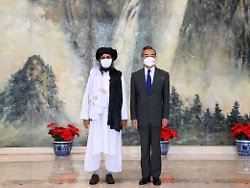Tuesday 17th August 2021
Flirt with the Taliban
Afghanistan’s natural resource treasure attracts China
By Jan Gänger
The USA and Europe have been trying in vain for 20 years to build a civil society in Afghanistan after the Taliban was overthrown. Now the Islamists are back in power. China sees a great opportunity in the failure of the West.
While the West collapsed in Afghanistan, China is drawing closer to the new rulers. After the Taliban captured Kabul, Beijing agreed to “friendly and cooperative relations”. China respects the right of the Afghan people to independently decide their own fate.
The fact that the majority of Afghans certainly do not want the Taliban in power does not matter to the Chinese government. Two things are important to her. On the one hand, there are tough economic interests in the neighboring country, with which China shares a 76-kilometer border. On the other hand, Beijing wants to prevent the Muslim population in the northwestern region of Xinjiang from becoming radicalized and separatists from using Taliban-controlled areas as refuge – good relations with the new rulers in Afghanistan are therefore of great advantage.
One reason for the rapprochement is likely to be that China wants to secure its billions in investments in raw materials in the neighboring country. Not without reason, after meeting Foreign Minister Wang, the Taliban said they hoped China could play a bigger economic role.
That is exactly what China wants. So far, the country has been primarily active in copper mining in Afghanistan, where it has invested billions of dollars. Oil and gas production also plays a role for Beijing. But these are just peanuts compared to the potential that lies in Afghanistan’s soil – and now that the American army and European companies are pulling out, China sees a great opportunity.
Huge deposits of raw materials
Afghanistan is rich in mineral resources – even if the exact volume cannot be quantified. The United States Geological Survey (USGS) estimated the value at around $ 900 billion in 2010. The Afghan government at the time even spoke of three trillion dollars.
In addition to copper, cobalt and coal, Afghanistan also has oil and gas reserves. Rare earths are also attracting particular interest – and above all lithium, which is required worldwide for the production of electric car batteries. Based on the USGS report, the US Department of Defense called Afghanistan the “Saudi Arabia of Lithium”. The Taliban are sitting on this treasure and the Chinese would like to find it.
So far, fighting, corruption and a lack of administrative structures have prevented Afghanistan’s natural resources from being exploited on a large scale. With the takeover of power across the country, the Taliban could achieve what the governments failed to do in the past 20 years after they were driven out: to create an environment that enables and protects foreign investment. The gigantic investment debacle in the West shows how important this is. According to Bloomberg, the USA alone has pumped 840 billion dollars into the development of the country. Germany has also sunk a lot of money – for example, almost 50 million euros were invested in the expansion of the Mazar-i-Sharif airport, where the Bundeswehr had its headquarters.
“Are very pragmatic”
China helps that, unlike the West, it does not intend to establish a civil society in Afghanistan and does not want to interfere in internal Afghan conditions and conflicts. Or as China’s Foreign Minister Wang put it in a telephone conversation with US Secretary of State Antony Blinken: Afghanistan shows that it is difficult to apply a foreign model in a country with a different history and culture. China’s state media published several reports last week highlighting that Afghanistan was the “graveyard of empires”. “We are very pragmatic. How you want to govern your country is largely up to you,” argues Lin Minwang, a South Asia expert at Fudan University in Shanghai.
China also benefits from the fact that, unlike Russia or the United States, it never fought the Taliban. And so Beijing can try to apply a business model in Afghanistan that is extremely successful: governments lend money to finance infrastructure projects that are carried out by Chinese companies and from which China benefits in the long term.
This can be seen particularly well on the “New Silk Road”. In neighboring Pakistan, China is investing 62 billion dollars in Pakistan’s energy and transportation systems as part of the Silk Road project. Beijing wants to secure access to markets in the Middle East, Europe and Africa via the shortest land and sea routes. The risks for China caused by regional instability cannot be overlooked either: In July, 13 people, including nine Chinese workers, were killed in a suicide attack on a bus in Pakistan.
The bus was supposed to take Chinese engineers, experts and other personnel to the Dasu Dam construction site in Khyber Pakhtunkhwa Province. In April, the Pakistani Taliban committed themselves to a suicide attack on a luxury hotel in Baluchistan province, which was then hosted by the Chinese ambassador. The diplomat was unharmed, but at least five people died.
In the past few years, China has invested billions in infrastructure projects in Pakistan. Projects financed by China are met with resistance, especially from insurgents. They argue that the local population does not benefit from the large-scale projects, that most of the jobs and most of the income went to foreigners.
Against this background, China would enable stability in Afghanistan to further expand the planned “New Silk Road”. For the Taliban, China could become an important source of foreign investment and economic support. Federal Development Minister Gerd Müller announced that Germany would suspend development cooperation. That shouldn’t hurt the Taliban too much.
.
